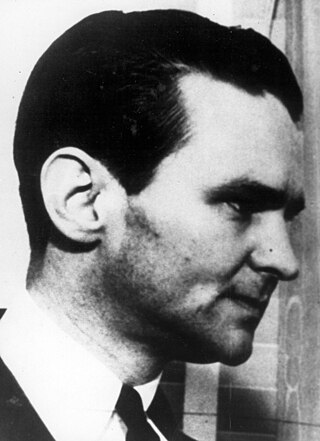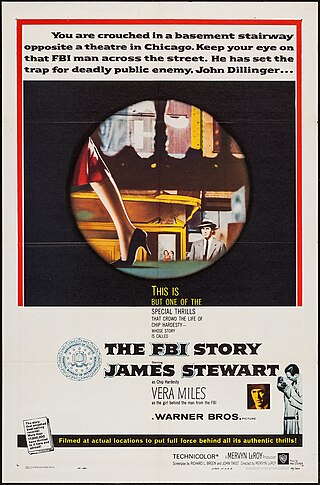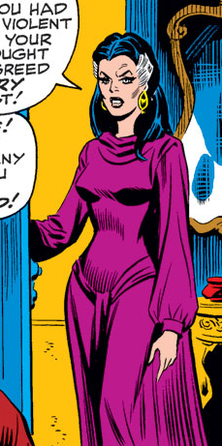
The Federal Bureau of Investigation (FBI) is the domestic intelligence and security service of the United States and its principal federal law enforcement agency. An agency of the United States Department of Justice, the FBI is also a member of the U.S. Intelligence Community and reports to both the Attorney General and the Director of National Intelligence. A leading U.S. counterterrorism, counterintelligence, and criminal investigative organization, the FBI has jurisdiction over violations of more than 200 categories of federal crimes.

John Edgar Hoover was an American law-enforcement administrator who served as the final Director of the Bureau of Investigation (BOI) and the first Director of the Federal Bureau of Investigation (FBI). President Calvin Coolidge first appointed Hoover as director of the BOI, the predecessor to the FBI, in 1924. After 11 years in the post, Hoover became instrumental in founding the FBI in June 1935, where he remained as director for an additional 37 years until his death in May 1972 – serving a total of 48 years leading both the BOI and the FBI and under eight Presidents.

Clyde Anderson Tolson was the second-ranking official of the FBI from 1930 until 1972, from 1947 titled Associate Director, primarily responsible for personnel and discipline. He was the protégé and long-time top deputy of FBI Director J. Edgar Hoover.

Karen Page is a fictional character appearing in American comic books published by Marvel Comics. She serves as the original love interest for Daredevil, under Matt Murdock's employ as his legal secretary. In 1999, Page was killed by Bullseye, and since the 1980s her role as primary love interest has been superseded by Elektra Natchios.

Melvin Horace Purvis II was an FBI agent instrumental in capturing bank robbers John Dillinger and Pretty Boy Floyd in 1934. All of this would later overshadow his military career which saw him directly involved with General George Patton, Hermann Göring, and the Nuremberg Trials.

Kate Barker, better known as Ma Barker, was the mother of several American criminals who ran the Barker–Karpis Gang during the "public enemy era" when the exploits of gangs of criminals in the Midwestern United States gripped the American people and press. She traveled with her sons during their criminal careers.

The F.B.I. is an American police television series created by Quinn Martin and Philip Saltzman for ABC and co-produced with Warner Bros. Television, with sponsorship from the Ford Motor Company, Alcoa and American Tobacco Company in the first season. Ford sponsored the show alone for subsequent seasons. The series was broadcast on ABC from 1965 until its end in 1974. Starring Efrem Zimbalist Jr., Philip Abbott and William Reynolds, the series, consisting of nine seasons and 241 episodes, chronicles a group of FBI agents trying to defend the US government from unidentified threats. For the entirety of its run, it was broadcast on Sunday nights.

Charles Arthur Floyd, nicknamed Pretty Boy Floyd, was an American bank robber. He operated in the West and Central states, and his criminal exploits gained widespread press coverage in the 1930s. He was seen positively by the public because it was believed that during robberies he burned mortgage documents, freeing many people from their debts. He was pursued and killed by a group of Bureau of Investigation agents led by Melvin Purvis. Historians have speculated as to which officers were at the event, but accounts document that local officers Robert "Pete" Pyle and George Curran were present at his fatal shooting and also at his embalming. Floyd has continued to be a familiar figure in American popular culture, sometimes seen as notorious, other times portrayed as a tragic figure, even a victim of the hard times of the Great Depression in the United States.

Jack Crawford is a fictional character who appears in the Hannibal Lecter series of novels by Thomas Harris, in which Crawford is the Agent-in-Charge of the Behavioral Science Unit of the FBI in Quantico, Virginia. He is modeled after John E. Douglas, who held the same position.

The FBI Story is a 1959 American crime drama film starring James Stewart, and produced and directed by Mervyn LeRoy. The screenplay by Richard L. Breen and John Twist is based on a book by Don Whitehead.

John Edward Douglas is an American retired special agent and unit chief in the United States Federal Bureau of Investigation (FBI).

Vanessa Fisk is a fictional character appearing in American comic books published by Marvel Comics. She is married to the crime boss the Kingpin and is the mother of Richard Fisk, although she herself is not portrayed as a villain, and does not approve of her husband's criminal activities. Vanessa has been featured in a number of stories about the Kingpin, usually in those revolving around the superheroes Daredevil and Spider-Man.
Junior G-Men was an American boys club and popular culture phenomenon during the late 1930s and early 1940s that began with a radio program and culminated with films featuring the Dead End Kids.

Arthur Raymond "Doc" Barker was an American criminal, the son of Ma Barker and a member of the Barker-Karpis gang, founded by his brother Fred Barker and Alvin Karpis. Barker was typically called on for violent action, while Fred and Karpis planned the gang's crimes. He was arrested and convicted of kidnapping in 1935. Sent to Alcatraz Federal Penitentiary in 1936, he was killed three years later while attempting to escape.

The Behavioral Science Unit (BSU) is the original name of a unit within the Federal Bureau of Investigation's (FBI) Training Division at Quantico, Virginia, formed in response to the rise of sexual assault and homicide in the 1970s. The unit was usurped by the Critical Incident Response Group (CIRG) and renamed the Behavioral Research and Instruction Unit (BRIU) and currently is called the Behavioral Analysis Unit (5) (BAU-5) within the National Center for Analysis of Violent Crime (NCAVC). The BAU-5 currently works on developing research and then using the evidence-based results to provide training and improve consultation in the behavioral sciences—understanding who criminals are, how they think, why they do what they do—for the FBI and law enforcement communities.

Frederick George Barker was an American criminal who, along with Alvin Karpis, co-founded the Barker-Karpis gang, which committed numerous robberies, murders and kidnappings during the 1930s. Barker was the youngest son of Ma Barker, all of whose children were criminals. He was killed in a lengthy gunfight with the Federal Bureau of Investigation (FBI) in 1935.

J. Edgar is a 2011 American biographical drama film based on the career of FBI director J. Edgar Hoover, directed, produced and scored by Clint Eastwood. Written by Dustin Lance Black, the film focuses on Hoover's life from the 1919 Palmer Raids onward. The film stars Leonardo DiCaprio in the title role along with Armie Hammer, Naomi Watts, Josh Lucas, and Judi Dench, and features Adam Driver in his film debut.

The third and final season of the American streaming television series Daredevil, which is based on the Marvel Comics character of the same name, follows Matt Murdock / Daredevil, a blind lawyer-by-day who fights crime at night. When Wilson Fisk is released from prison, Murdock must decide between hiding from the world or embracing his life as a hero vigilante. The season is set in the Marvel Cinematic Universe (MCU), sharing continuity with the films and other television series of the franchise. It was produced by Marvel Television in association with ABC Studios, with Erik Oleson serving as showrunner and series creator Drew Goddard acting as a consultant.


















